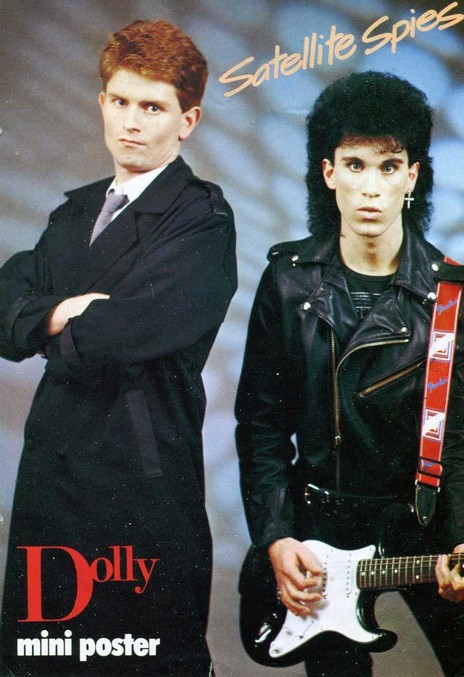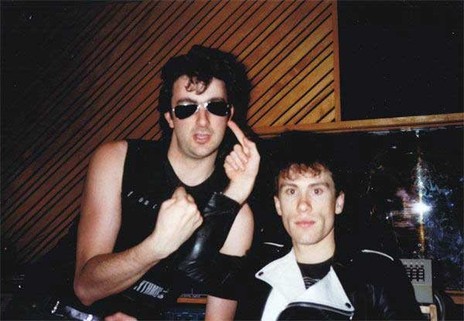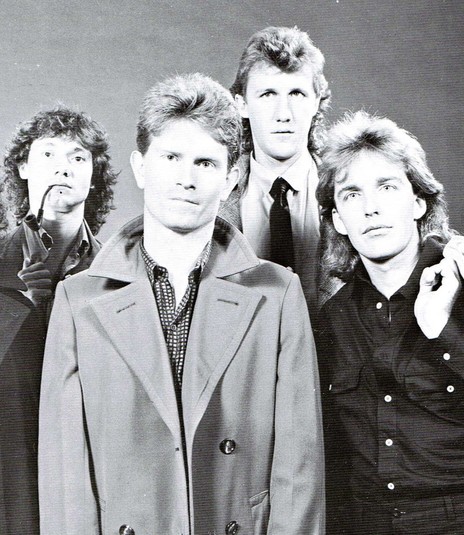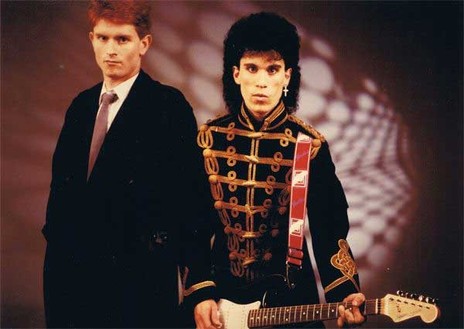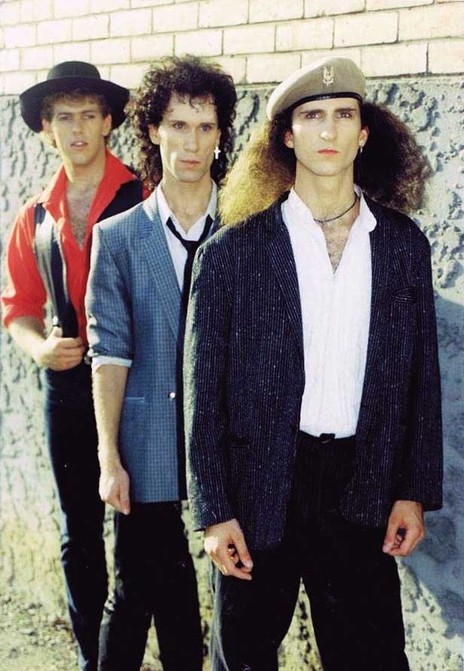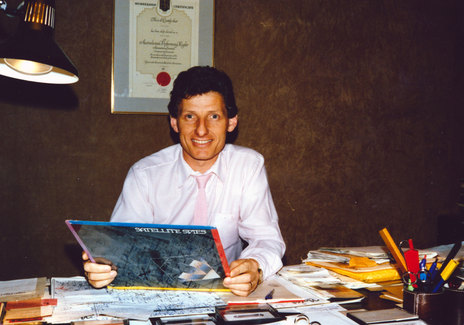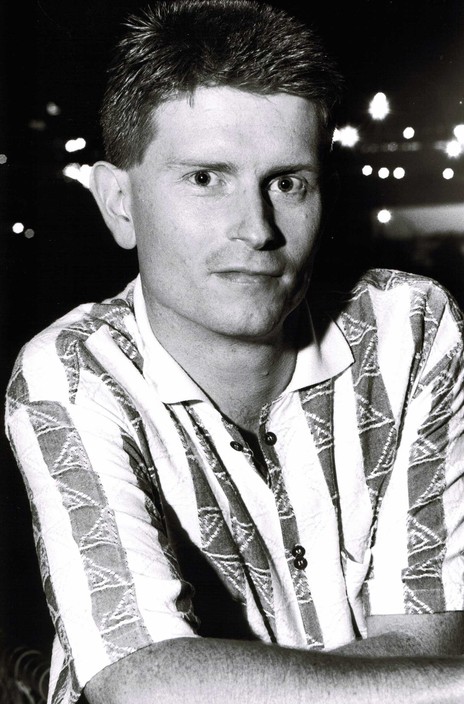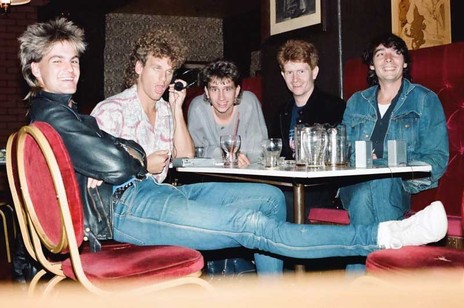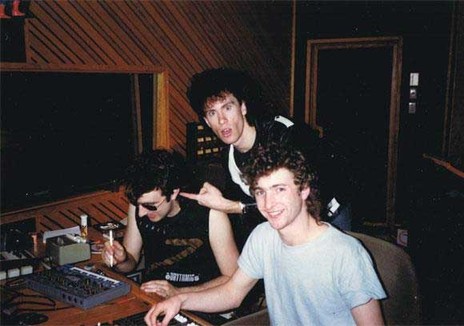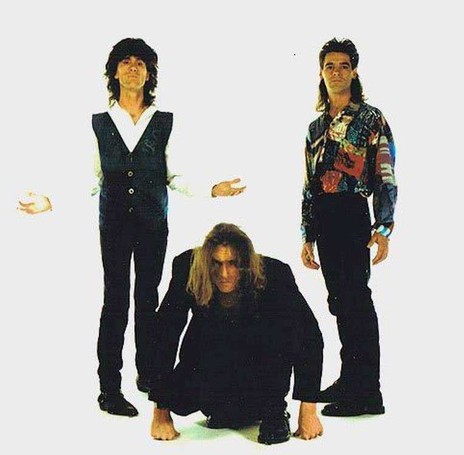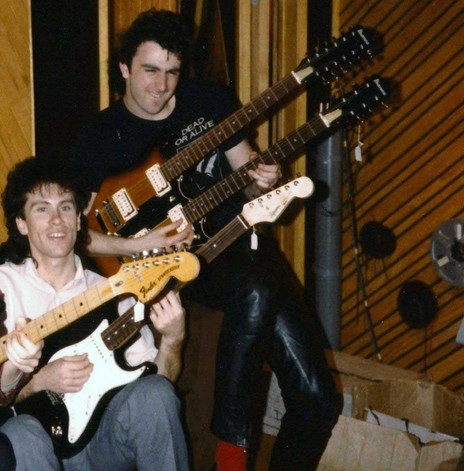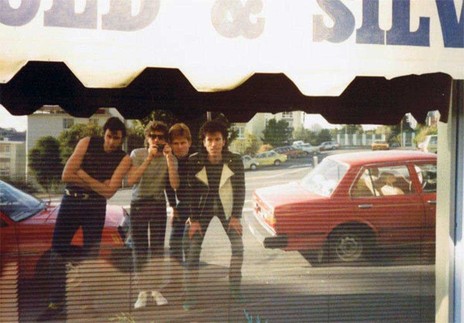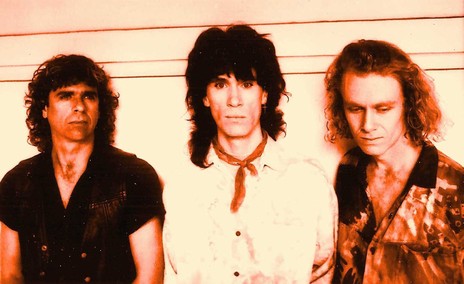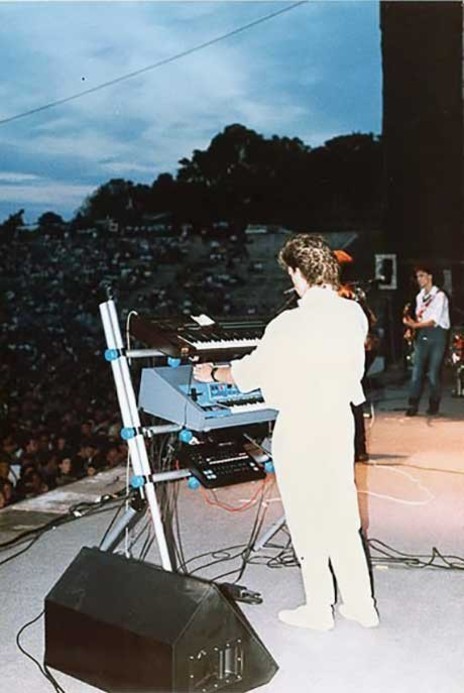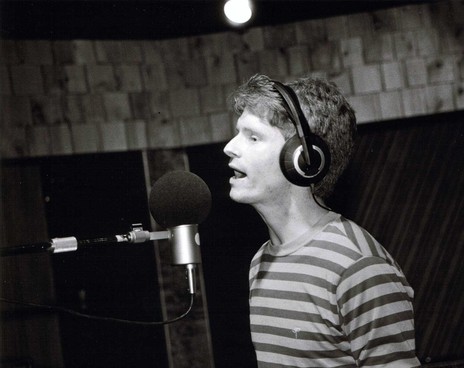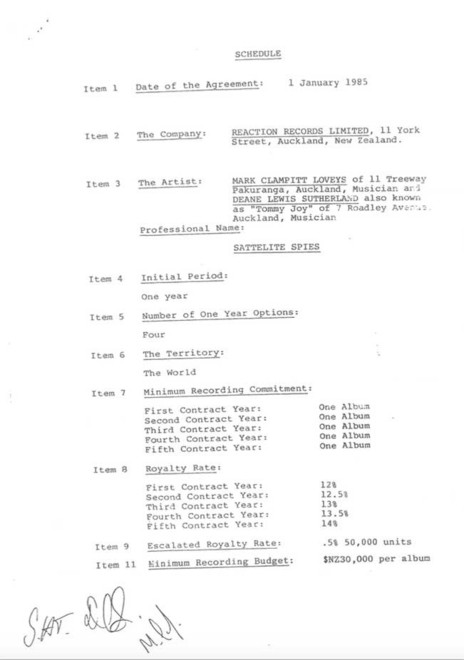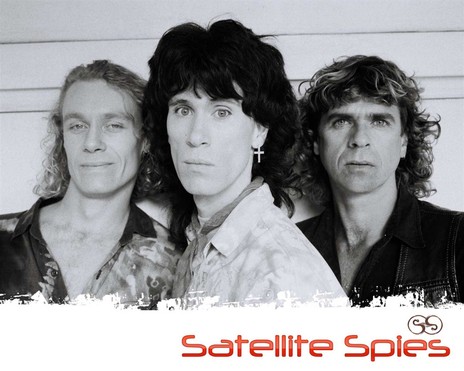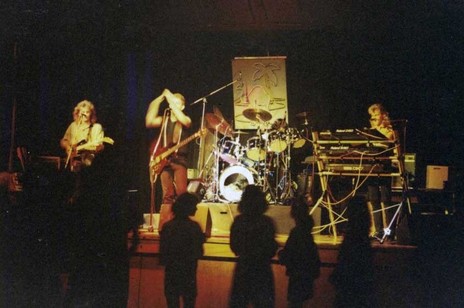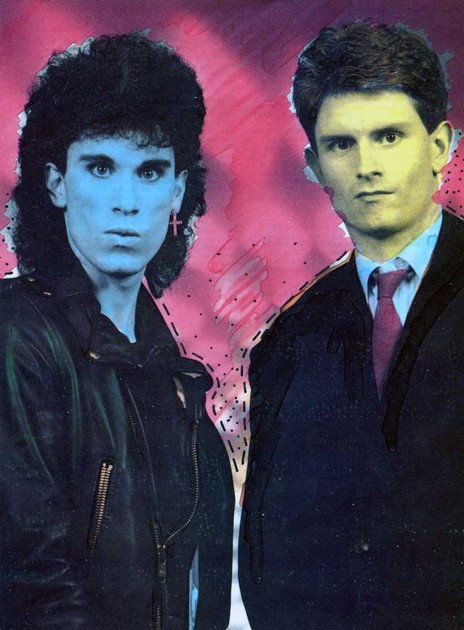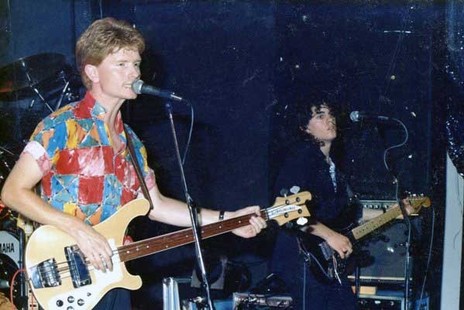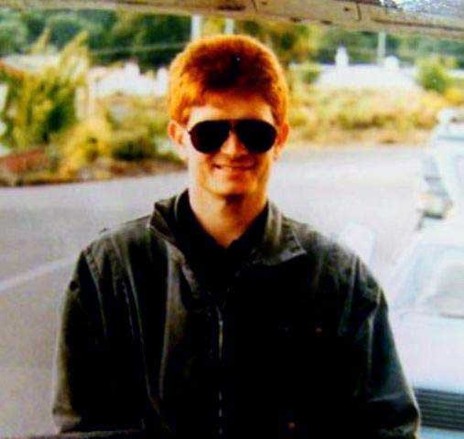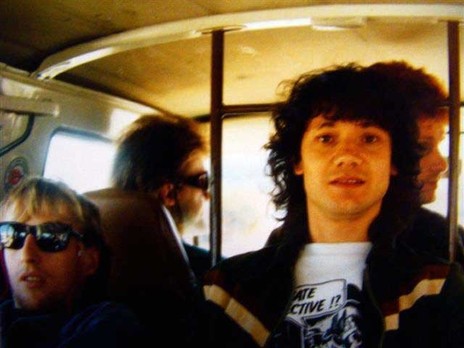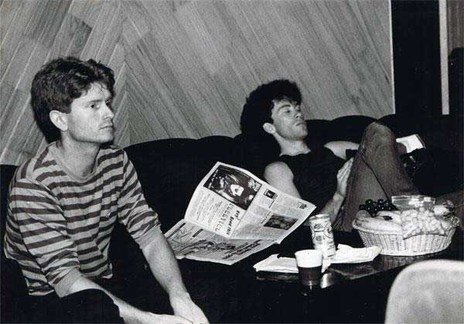The trademark registration was made in New Zealand in April 1987 and was published in the business papers of the day but has never received any written objection. Mark Loveys says when he learned of the issue in the 1990s he didn’t have the wherewithal to contest it and believed the matter would quickly die away.
Since 1991, Satellite Spies has been Deane Sutherland’s baby with a revolving door of musicians.
But since 1991, Satellite Spies has been Deane Sutherland’s baby with a revolving door of musicians and constant touring to all corners of the country. The 1980s Satellite Spies revolved around the songwriting of Loveys with the unwavering support of Mandrill Recording Studios and Reaction Records boss Glyn Tucker Jnr and helping hands from contemporaries DD Smash and The Mockers.
Much of the contention centres on the band name. Loveys and Tucker insist they hit upon it at a brainstorming session in Sutherland’s absence after The Satellites and The Spies were both bandied about, but Sutherland is adamant he came up with Satellite Spies well before they were signed to Reaction as a duo.
The two met in the mid-1970s when Mark Loveys played clarinet and piano at Pakuranga College and Deane Sutherland was a guitar-toting student at nearby Edgewater College. Sutherland was the guitarist in a school band that Loveys followed called Hot Stuff.
They had up to eight members at times, so Sutherland, who also sang, left to form a more manageable unit. He helped Loveys learn the bass guitar and they jammed in a band that went through many name changes including Oasis and Nirvana. When Sutherland wasn’t always available Loveys decided he’d better step up and take on vocal duties. That led to him writing his own songs.
By the early 1980s, the two went in separate directions and Loveys hooked up with drummer Tony Bouwmeester, his keyboardist brother Michael Bouwmeester and guitarist Andrew Cochrane in an outfit they called Blasé.
Cochrane’s father worked in the advertising industry and coerced Blasé to record a jingle for dairy cow bloat control product Bloatenz at Mandrill Recording Studios in 1983. If they did, he promised he would put up a bit more money for Blasé to record a couple of their songs after the ad was completed.
They finished the jingle and started into their own material when Mandrill owner Glyn Tucker sauntered in and told the band he really liked the songs and would be interested in working with them with a view to releasing something on his own Reaction label.
During the rest of 1983 and 1984, Blasé were regulars at the studio, demoing tracks written by Loveys including ‘Destiny In Motion’ and ‘Wish I’d Asked (That Girl)’. The band toured the country and released the Tucker-produced singles ‘Rock Solid’ and ‘Just Like The Old Days’ on Reaction.
Tucker took the Blasé songs to the Midem music conference in Cannes, France, in January 1984 to try and attract some international interest. There he met Sandy Roberton, the manager of up-and-coming English producer Tim Palmer, who had produced tracks for Kajagoogoo and their singer Limahl and engineered recordings by Donovan, Mark Knopfler and Dead Or Alive.
For the next few months, Tucker and Roberton corresponded about Palmer producing an album for the band. However, nobody was keen on the Blasé name and thought they didn’t have a strong enough image. The band was splintering anyway as Andrew Cochrane was moving to Brisbane, but Tucker was hell-bent on retaining Mark Loveys in some capacity.
With Palmer interested and Tucker able to finance the sessions it was decided to relaunch with a new look. Loveys caught up with his old mate Deane Sutherland whose rock star leather jacket, pierced ear, big hair and high cheekbones were diametrically opposed to the everyman look of the red-headed Loveys.
Since his garage band days with Loveys, Sutherland had fronted Rated X with former Lip Service bass player Brian O’Donnell and ex-Gary Havoc & The Hurricanes drummer Graeme Scott. Their song ‘Tangled Wires’ was included alongside tracks by The Narcs and Billy TK on the Hauraki Homegrown ’81 LP.
Sutherland signed a solo recording deal with Harlequin Studios owner Doug Rogers’ Ze Disc in 1982. It led nowhere and Rogers had him replace guitarist Chris Prendergast in labelmates Tomorrow’s Parties soon after their single ‘To The Beat’ was released. The heavy drug scene around the band led to his leaving and then Mark Loveys contacted him with the offer of joining forces to work on an album at Mandrill.
By this time Sutherland had adopted the stage name Tommy Joy in a tongue-in-cheek protest against the business side of rock and roll.
Loveys and Sutherland signed with Reaction on 1 January 1985 as a duo – following the trend of recent successful international twosomes Hall & Oates, Tears For Fears and Go West. By this time Sutherland had adopted the stage name Tommy Joy in a tongue-in-cheek protest against the business side of rock and roll and the alias was included on the contract.
As far as he is concerned, the Satellite Spies name was something he came up with while still in Tomorrow’s Parties and he only offered it up when the duo were stuck. Loveys and Tucker say they decided on it at Tucker’s Half Moon Bay home in December 1984. To go with the name, Sutherland was charged with creating the duo’s look and he took Loveys clothes shopping before publicity shots were taken.
Shortly afterwards Tim Palmer arrived from London and work began at Mandrill on a Satellite Spies album. The producer brought his own engineer, Chris Sheldon, who had worked with him on Kajagoogoo and Dead Or Alive projects as well as being assistant engineer on Elkie Brooks’ 1984 Minutes LP.
There were already several rhythm tracks in the can from the Blasé sessions with the Bouwmeester brothers that the producer opted to keep, including ‘Destiny In Motion’ and ‘Wish I Asked (That Girl)’. ‘Destiny In Motion’ had been a heavy guitar-driven number, but Palmer added a distinctive synth part on a keyboard he’d brought with him that gave the song an up-to-date, modern feel.
Work continued on a tight schedule with studio men Steve Garden on drums and Bruce Lynch adding keyboards. Mark Loveys played clarinet on a track, taking advantage of the classical training of his youth. During the sessions Sutherland’s wicked sense of humour came to the fore and he would amuse the others by inventing outlandish pseudonyms. He bestowed the names The Skull on Palmer and Stiffy Boatman on Sheldon.
When it came time to put out the first single all agreed the standout song was ‘Wish I’d Asked (That Girl)’, but the thinking was to go with their second-best pick to build up interest. ‘Destiny In Motion’ was released in September 1985 and immediately found favour on TV and radio; many of the programmers not realising Satellite Spies were a New Zealand band. The song peaked at No.14 in the NZ Singles Chart, staying on the chart for 10 weeks.
At the 1985 NZ Music Awards they were judged Most Promising Group over fellow finalists Everything That Flies and Katango, and Mark Loveys was awarded Most Promising Male Vocalist over Katango’s Paul Eversden and American-born James Gaylyn of Rise.
Ironically, the duo, producer and label’s choice of strongest song, ‘Wish I’d Asked (That Girl)’, never even charted. Again, radio was quick to playlist it, though when distributor Festival failed to get stock in the shops fast enough and it didn’t appear on the charts, radio dropped it.
But Satellite Spies were about to be dealt some good fortune. Former Split Enz bass guitarist, label owner and A&R man Mike Chunn was working with Glyn Tucker and had sent the band’s cassette to UK heavyweights Dire Straits, who were due in New Zealand with their massive Brothers In Arms Tour in March 1986.
Dire Straits hand-picked their support acts, and leader Mark Knopfler later told Satellite Spies that when their tape started with ‘Wish I’d Asked (That Girl)’, they were instantly given the nod. Bass guitarist John Illsley was keen to produce their next album but schedules couldn’t be agreed.
Their inclusion on the tour meant Satellite Spies were in immediate need of a backing band. They recruited DD Smash drummer Peter Warren and two keyboard players – The Mockers’ Tim Wedde and Australian Mark Watson, who was working as a session musician and writer-arranger at Mandrill – to cover the impending album’s overlaid parts.
The Dire Straits tour kicked off with two shows at Auckland’s Mt Smart Stadium before moving to Athletic Park in Wellington and finishing at Lancaster Park in Christchurch. It was between Wellington and Christchurch that cracks began appearing in the relationship between Loveys and Sutherland.
After the Wellington show, which had seen kids’ TV programme Spot On following Satellite Spies as they set up for the gig, Sutherland disappeared. He went home with a young lady and the next morning missed the flight south, but he did manage to secure a later one.
When he reached Christchurch with no itinerary or accommodation details, he fronted up to a radio station that took him in for an interview. Someone in the touring party heard and made contact. The rest of the band had spent the afternoon hastily rearranging songs in case the guitarist didn’t show. He did with moments to spare.
The airplay they enjoyed with ‘Destiny In Motion’ and ‘Wish I’d Asked (That Girl)’ ensured Satellite Spies were well received. Dire Straits invited them to Australia to conclude the tour, but the Musicians’ Union of Australia insisted support acts there had to be Australian.
Strangely, all the Dire Straits exposure didn’t translate to album sales when the Destiny In Motion LP was released later in the month and struggled to No.42, staying in the charts for just one week.
Satellite Spies hit the road in support of the record. Peter Warren and Mark Watson were unavailable, but Wedde remained while The Mockers were on hold. Drummer Gordon Joll, a regular presence at Mandrill for some years on jingles and sessions for everyone from Prince Tui Teka to Tommy Adderley to Noel Parlane, replaced Warren.
The tension between Loveys and Sutherland was palpable to him from the earliest rehearsal.
Tiring of sessions and covers bands and having enjoyed a taste of the touring life with Hot Ash during the 1970s, Joll was again looking to contribute to a band playing their own material. But the tension between Loveys and Sutherland was palpable to him from the earliest rehearsal.
Not long after the band entered Mandrill to record a new Loveys song, ‘Living In A Minefield’, things came to a head. Glyn Tucker, who had essentially been the band’s manager as well as their label boss, called Loveys and Sutherland to a meeting in which he spoke about behaviour and attitude that resulted in the departure of Deane Sutherland aka Tommy Joy.
Sutherland’s memory of the split is quite different. He says the CBS office in London had been presented with Satellite Spies product via an associate of Tucker’s and had made an offer to buy out the Reaction contract and have the band relocate to England. In Sutherland’s mind, when Loveys refused to take that opportunity, Satellite Spies Mk.1 ended.
Loveys and Tucker refute the existence of any overseas offer and say if any such advance had been made the deal would have been done. However, as Tucker had signed Satellite Spies on the strength of his belief in Mark Loveys – who had written and sung all of the songs on Destiny In Motion – his assertion was it was business as usual.
With a national tour to promote ‘Living In A Minefield’ imminent, they brought in guitarist Grant Wills, just back from Los Angeles. Tim Wedde suggested adding his Mockers bandmate Brett Adams, who was not dissimilar in appearance to Sutherland, as second guitarist. Dave Curtis later replaced Wedde for a stint.
After the tour, the band sans Wills and Curtis did more recording at Mandrill, including the single ‘Private Detective’. The following March, The Mockers released Emperor’s New Clothes and recalled Wedde and Adams for promotional work. Satellite Spies stabilised with Curtis and guitarist Eddie Pausma joining Loveys and Gordon Joll on tour with the likes of Peking Man and Ardijah.
Two more singles were released – ‘Only Here For The Rock’n’Roll’ and ‘Gonna Have To Change’ – but a second LP remained on the shelf when Satellite Spies quietly disbanded. The album would eventually see the light of day as Us Against The World when released digitally under the name Mark Loveys’ Satellite Spies in December 2011.
But in early 1988, Loveys’ hobby of computer programming was turning into a full-blown career. There was certainly more money in programming than in the NZ music business of the late 1980s. By the time Gordon Joll successfully auditioned for Herbs, Satellite Spies were effectively finished.
Or were they? After parting ways with Loveys and wishing to retain the moniker he believed was rightfully his, Deane Sutherland trademarked the Satellite Spies name. With his drummer brother Hamish Sutherland he took off to Australia, where the pair picked up bass guitarist John Godfrey and started gigging as Satellite Spies. In 1990, the Sutherlands did the same thing in Birmingham, England.
Later that year, Sutherland returned to New Zealand calling in to Mandrill to ask Glyn Tucker if he could borrow the 24-track master of Destiny In Motion to lift sound effects from. Tucker declined. Soon after Sutherland was fronting a Satellite Spies trio that included his former Rated X drummer Graeme Scott and bass guitarist Willy Seiffert.
The first Mark Loveys knew of the revival of Satellite Spies was when he started fielding calls from friends saying, “Oh, I hear you’ve got the band back together.” He phoned Sutherland who told him he had trademarked the name a few years earlier. “Don’t you read the Mercantile Gazette?” Sutherland exclaimed.
This Satellite Spies toured New Zealand several times over, with Nathan Billings replacing Seiffert, and in 1994 released the Sutherland-penned song ‘It Must Be Love’, produced by Exponents producer Duffy. Tim Palmer remixed the song and it was again released in 1999. It would prove to be Satellite Spies’ highest charting single, peaking at No.9 and staying on the charts for 22 weeks.
Satellite Spies continued as a road band throughout the 1990s and into the millennium with Sutherland adding various rhythm sections. Graeme Scott has been the most consistent member but other drummers have included future D4 member Daniel “Beaver” Pooley and Jody Wakeman. Bass guitarists have included Billings, former drummer Hamish Sutherland, Lyle Jenkins and Robin Tioke.
